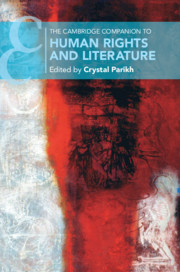Book contents
- The Cambridge Companion to Human Rights and Literature
- The Cambridge Companion to Human Rights and Literature
- Copyright page
- Epigraph
- Contents
- Notes on Contributors
- Chronology of Major Works and Events, 1215–2018
- Introduction
- Part I Genealogies and Contexts
- Part II Fashioning Methods
- Part III Generic Representations
- 9 Narrating the Human Person
- 10 The Dramas of Human Rights
- 11 Poetic Justice and the Idea of Poetic Redress
- 12 Truth-Telling
- 13 Visualizing the World
- Part IV Writing Human Rights
- Select Bibliography
- Index
- Cambridge Companions To …
11 - Poetic Justice and the Idea of Poetic Redress
from Part III - Generic Representations
Published online by Cambridge University Press: 24 June 2019
- The Cambridge Companion to Human Rights and Literature
- The Cambridge Companion to Human Rights and Literature
- Copyright page
- Epigraph
- Contents
- Notes on Contributors
- Chronology of Major Works and Events, 1215–2018
- Introduction
- Part I Genealogies and Contexts
- Part II Fashioning Methods
- Part III Generic Representations
- 9 Narrating the Human Person
- 10 The Dramas of Human Rights
- 11 Poetic Justice and the Idea of Poetic Redress
- 12 Truth-Telling
- 13 Visualizing the World
- Part IV Writing Human Rights
- Select Bibliography
- Index
- Cambridge Companions To …
Summary
This chapter provides a survey of poetic reactions to human rights violations in the contemporary world. Theodor Adorno declared in 1949, “There can be no poetry after Auschwitz,” a sentiment symptomatic of the shock that made literature seem inadequate in dealing with the scale of human injustice revealed by the Holocaust. However, the human capacity for wrongdoing remains endemic to our times. Wherever human rights violations have proved irresistible, poets have sought redress through the symbolic action of poetry, giving proof of how we might invert the sentiments of Walter Benjamin’s claim that “There is no document of civilization which is not at the same time a document of barbarism.” In the teeth of modern barbarism, as this chapter aims to demonstrate, poetry continues to remind humanity of what will keep us humane and human.
- Type
- Chapter
- Information
- The Cambridge Companion to Human Rights and Literature , pp. 154 - 166Publisher: Cambridge University PressPrint publication year: 2019

